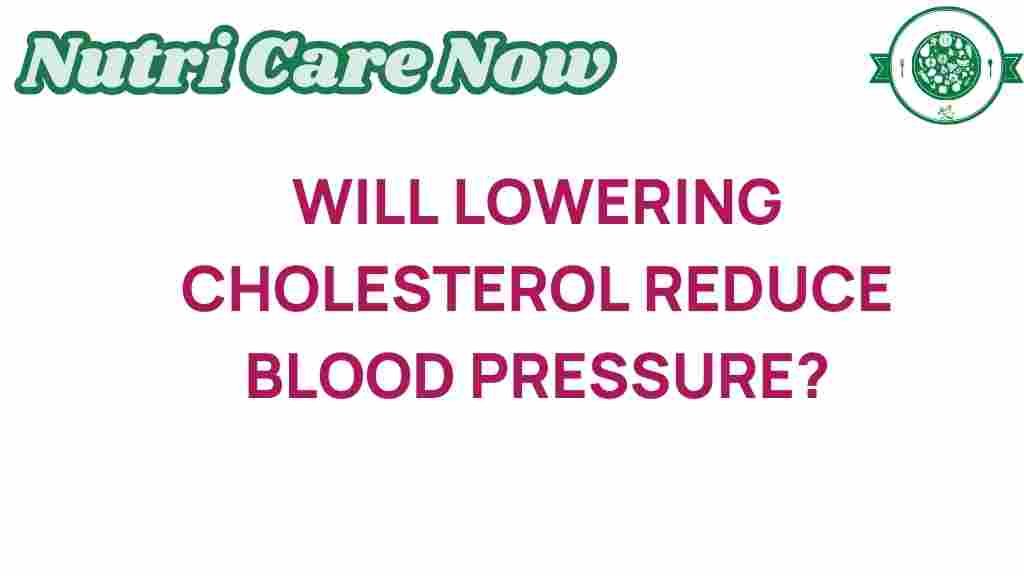Can Lowering Cholesterol Truly Diminish Blood Pressure?
Cholesterol and blood pressure are two crucial factors that significantly impact heart health. Understanding their relationship can help individuals make informed decisions about their diet, lifestyle, and overall wellness. This article explores whether lowering cholesterol can effectively diminish blood pressure, the health risks associated with high cholesterol and hypertension, and practical steps to improve cardiovascular health through nutrition and lifestyle changes.
The Relationship Between Cholesterol and Blood Pressure
Cholesterol is a waxy substance found in your blood, necessary for building cells and producing hormones. However, high levels of cholesterol can lead to atherosclerosis, a condition characterized by the buildup of fatty deposits in the arteries. This can restrict blood flow and elevate blood pressure.
Blood pressure, measured in mmHg, indicates the force of blood against the walls of your arteries. High blood pressure, or hypertension, increases the risk of heart disease and stroke. The link between cholesterol and blood pressure is complex, but managing cholesterol levels can play a significant role in heart health.
Health Risks of High Cholesterol and Blood Pressure
Elevated cholesterol and blood pressure levels pose several health risks, including:
- Heart Disease: Both conditions contribute to the development of coronary artery disease (CAD), potentially leading to heart attacks.
- Stroke: High blood pressure can cause blood vessels in the brain to burst or become blocked.
- Kidney Damage: Hypertension can impair kidney function, leading to chronic kidney disease.
- Vision Loss: High blood pressure can damage the blood vessels in the retina, leading to vision problems.
Can Lowering Cholesterol Lower Blood Pressure?
Research suggests that lowering cholesterol levels can have a positive impact on blood pressure. When cholesterol levels are reduced, the risk of atherosclerosis diminishes, leading to improved blood flow and potentially lower blood pressure. Here are some ways in which lowering cholesterol may help:
- Improved Arterial Function: Lower cholesterol can enhance the elasticity of arteries, promoting better circulation.
- Decreased Inflammation: High cholesterol levels can lead to inflammation in blood vessels. Reducing cholesterol may help mitigate this effect.
- Weight Loss: Lowering cholesterol often involves dietary changes that can lead to weight loss, which is beneficial for reducing blood pressure.
Steps to Lower Cholesterol and Blood Pressure
Adopting a heart-healthy lifestyle is essential for lowering cholesterol and blood pressure. Here are some effective steps:
1. Improve Your Diet
Nutrition plays a vital role in managing cholesterol and blood pressure. Consider the following dietary changes:
- Increase Fiber Intake: Foods high in soluble fiber, such as oats, beans, and fruits, can help lower cholesterol levels.
- Choose Healthy Fats: Replace saturated and trans fats with healthy fats found in olive oil, avocados, and nuts.
- Limit Sodium: High sodium intake can raise blood pressure. Aim for less than 2,300 mg of sodium per day.
- Incorporate Omega-3 Fatty Acids: Fatty fish like salmon and mackerel can improve heart health.
2. Maintain a Healthy Weight
Being overweight increases the risk of high cholesterol and blood pressure. Losing even a small amount of weight can have significant health benefits:
- Set Realistic Goals: Aim for a gradual weight loss of 1-2 pounds per week.
- Engage in Regular Physical Activity: Aim for at least 150 minutes of moderate aerobic exercise each week.
3. Adopt a Healthy Lifestyle
Several lifestyle changes can help you manage cholesterol and blood pressure more effectively:
- Quit Smoking: Smoking damages blood vessels and contributes to high blood pressure.
- Limit Alcohol Consumption: Excessive drinking can raise blood pressure. Moderation is key.
- Reduce Stress: Chronic stress can negatively impact heart health. Consider relaxation techniques such as yoga or meditation.
4. Regular Health Screenings
Regular check-ups with your healthcare provider can help monitor cholesterol and blood pressure levels:
- Annual Blood Tests: Get your cholesterol levels checked at least once a year.
- Monitor Blood Pressure: Have your blood pressure measured regularly to stay informed about your cardiovascular health.
Troubleshooting Tips for Managing Cholesterol and Blood Pressure
If you’re struggling to manage your cholesterol or blood pressure despite making lifestyle changes, consider the following troubleshooting tips:
- Consult a Nutritionist: A professional can provide personalized dietary advice and meal plans.
- Medications: Discuss with your doctor if cholesterol-lowering medications (statins) or blood pressure medications are appropriate for you.
- Stay Informed: Read up on the latest research regarding cardiovascular health and stay motivated.
Conclusion
Lowering cholesterol can indeed help diminish blood pressure, contributing to improved heart health and reduced health risks. By making informed dietary choices, maintaining a healthy weight, and adopting a heart-healthy lifestyle, individuals can effectively manage their cholesterol and blood pressure levels.
It’s essential to approach these changes holistically, understanding that nutrition and lifestyle play a vital role in overall wellness. For more information on nutrition and heart health, visit this resource. Additionally, to learn about effective strategies for managing cardiovascular health, check out this article.
Remember, small changes can lead to significant improvements in your health over time. Consult with healthcare professionals to create a personalized plan that works for you.
This article is in the category Health and created by NutriCareNow Team
